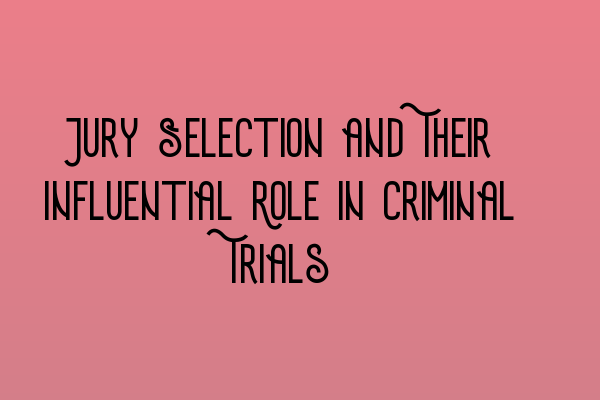Jury Selection and Their Influential Role in Criminal Trials
In a criminal trial, one of the key components of the legal process is the selection of jurors. The selection of the jury is crucial because they play a vital role in determining the outcome of the trial. Let’s delve into the importance of jury selection and how it can impact the course of a criminal trial.
What is Jury Selection?
Jury selection, also known as voir dire, is the process through which attorneys select individuals to serve as jurors in a trial. The purpose of the jury selection process is to ensure a fair and unbiased jury that can make an informed decision based on the evidence presented during the trial.
During the jury selection process, both the prosecution and defense attorneys have the opportunity to question potential jurors to determine their suitability for the case. This process helps identify any biases, prejudices, or conflicts of interest that could influence a juror’s ability to make an impartial decision.
The Role of the Jury
The jury in a criminal trial has the important responsibility of determining the defendant’s guilt or innocence based on the evidence presented in court. They must be impartial and consider only the facts presented during the trial, applying the law as instructed by the judge.
Juries serve as the “fact-finders” in a trial, assessing the credibility of witnesses, evaluating the strength of evidence, and ultimately rendering a verdict. Their role is vital to ensure justice is served and the accused receives a fair trial.
Factors to Consider in Jury Selection
The selection of the right jurors is critical to the outcome of a criminal trial. Attorneys consider several factors when choosing jurors, such as:
- Demographics: Attorneys may consider factors such as age, gender, occupation, and socioeconomic background to assess potential biases.
- Personal beliefs and experiences: Jurors with certain personal beliefs or past experiences may have biases that could impact their ability to be impartial.
- Attitude towards law enforcement: Jurors’ attitudes towards law enforcement can significantly influence their perception of the prosecution’s case.
- Ability to comprehend complex evidence: Attorneys assess potential jurors’ ability to understand complex evidence and legal concepts to ensure a fair evaluation of the case.
Challenges in Jury Selection
The process of jury selection is not without its challenges. Attorneys often face difficulties in identifying jurors who can be truly impartial and unbiased. Additionally, the preconceived notions about crime and the criminal justice system can affect a juror’s ability to objectively consider the evidence.
Ensuring a fair and impartial jury is crucial for both the prosecution and the defense to uphold the principles of justice. Attorneys strive to select jurors who can analyze the evidence objectively and make their decision solely based on the facts presented during the trial.
Conclusion
Jury selection plays a crucial role in criminal trials, as the jury ultimately determines the fate of the accused. Attorneys meticulously assess potential jurors to ensure they are fair, impartial, and capable of rendering a verdict based solely on the evidence presented. The selection process is a critical step in upholding the principles of justice and ensuring a defendant receives a fair trial.
To learn more about the SQE (Solicitors Qualifying Examination) and criminal law, you can check out the following related articles:
- SQE 1 Practice Exam Questions
- SQE 1 Practice Mocks FLK1 FLK2
- SQE 2 Preparation Courses
- SQE 1 Preparation Courses
- SRA SQE Exam Dates
